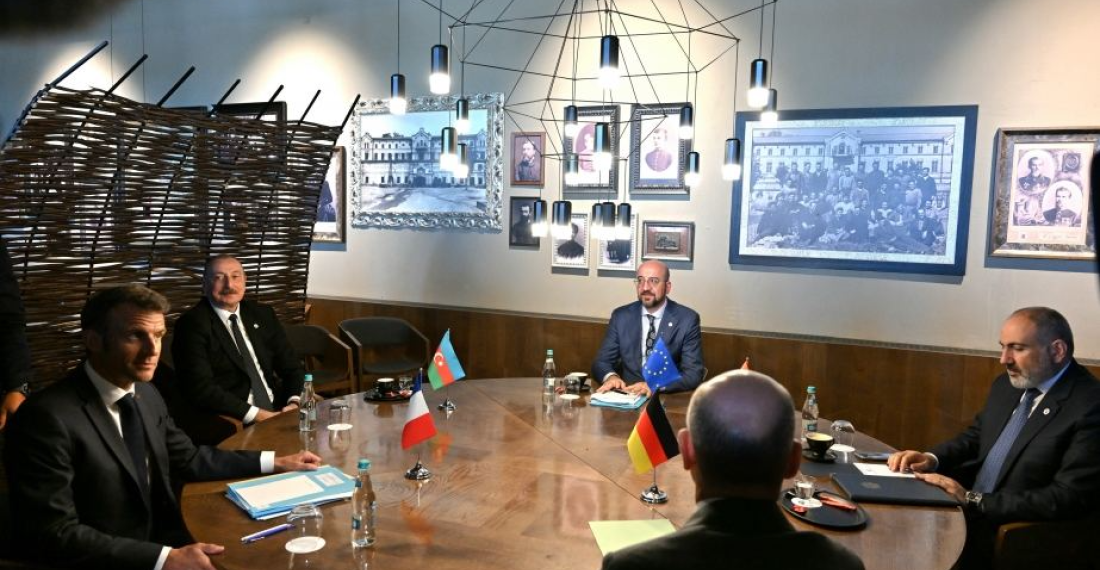The second summit of the European Political Community (EPC) is taking place today in Moldova (Thursday 1 June). During the summit, the Armenian Prime Minister Nikol Pashinyan and the Azerbaijani President Ilham Aliyev are meeting with European Council President Charles Michel, French President Emmanuel Macron, and German Chancellor Olaf Scholz.
The brainchild of Emmanuel Macron, the European Political Community's first summit took place in Prague, in October 2022. The EPC says that it is "a platform for political coordination among European countries across the continent," adding that it "aims to promote political dialogue and cooperation to address issues of common interest and to strengthen the security, stability, and prosperity of the European continent."
The EPC says that there are three main topics expected to be addressed by the 47 member states, which include every European country except Russia and Belarus. Those three topics are: joint efforts for peace and security; energy resilience and climate action; and interconnections in Europe for a better connected and more stable continent.
Maia Sandu, the President of Moldova and the host of the second EPC Summit, said in the run-up to the summit today that it is "an exceptional platform that provides small and large countries, both within and outside the EU, with an equal voice during discussions. This makes it an unparalleled forum."
Meanwhile, Moldova’s Deputy Prime Minister, Minister of Foreign Affairs and European Integration, Nicu Popescu, said: “The extensive and inclusive discussions demonstrate the importance and commitment to a successful outcome of the upcoming Summit. We look forward to a fruitful and productive dialogue on key issues that are critical for a connected, united Europe."
The programme
Representatives of the 47 member states of the EPC are gathering at Mimi Castle at 10am local time, 35km away from the Moldovan capital, Chisinau. This will be followed by an opening ceremony and a "family photo", with thematic roundtables and a working lunch taking place at 12.45am and 1.45pm, respectively.
At 3.30pm, the European Council President Charles Michel will chair a meeting with the Armenian Prime Minister Nikol Pashinyan and the Azerbaijani President Ilham Aliyev in the latest of a series of high-level meetings between Armenia and Azerbaijan.
In the last month, the leaders or foreign ministers of Armenia and Azerbaijan have met in Washington, Brussels, Moscow, and now Chisinau.
EPC summit has a strong Caucasus flavour
European Council President Charles Michel, speaking at the start of the meeting, highlighted EU relations with the South Caucasus countries.
He said:
"We are 45 countries represented here in Chișinău – it is a powerful symbol. We have a common political will to coordinate and cooperate in the field of energy, security and infrastructure. And we will have the opportunity today to discuss all those topics and to try to build more political convergence in order to defend some very important common interests.
"On Armenia/Azerbaijan: I had the opportunity to meet both leaders, of Armenia and Azerbaijan, in Brussels a few weeks ago. We made some progress and I hope it will again be an opportunity to confirm a common political will to normalise the relationship between the two countries.
"On Georgia: I am absolutely convinced that the future of Georgia is with the European Union family, but it is up to the Georgian authorities to take the right decisions in order to implement the reforms that are needed. The Georgian people, I think they know they can count on my personal support, they can count on the support of the European Union. I hope that the months to come will be a window of opportunity to make clear choices – not to please Brussels, but clear choices in order to make sure that the future of Georgia will be based on those fundamental European values: peace, prosperity, and economic and social development.
"I would be pleased, I would be more than happy to have the opportunity to pay a visit to Georgia and to the Georgian people again. The President of Georgia has invited me, and we will see when it will be possible to pay this visit to Georgia again.
"On Georgia’s candidate status I can say that we have a very clear political agenda. On the one hand, on the EU side, there is much more understanding that it is very important to take steps in the direction of the enlargement process. The European Commission will have the opportunity after the summer to publish a written report on enlargement. And I would like to repeat again that it is my intention, in my capacity, to put the topic on the agenda by the end of the year.
"A meeting between Michel, French President Macron, German Chancellor Sholz and the Armenian prime minister Nikol Pashinyan and Azerbaijani Leader, Ilham Aliyev is also taking place on Thursday."
The meeting between the leaders of Armenia, Azerbaijan, France and Germany, and Charles Michel, is taking place on Thursday afternoon/evening.
Updates will follow.







